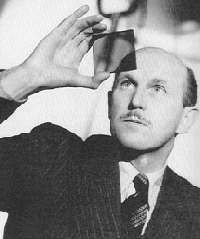PEEPING TOM (1960)
Director Michael Powell. Speaking of PEEPING TOM: "It vanished for twenty years, and I vanished with it."
Director Michael Powell. Speaking of PEEPING TOM: "It vanished for twenty years, and I vanished with it."
MICHAEL Powell’s collaboration with Hungarian Emeric Pressburger – which gave the British film industry a string of hits such as A MATTER OF LIFE AND DEATH, THE RED SHOES and THE TALES OF HOFFMAN – reveals strong elements of the fantastic. The work of Powell and Pressburger is often fragmented with emotional excess and hysterical behaviour, defying any classical sense of balance or order; their cinema is instilled with a magical and transcendent quality, in which the relationship between image and music is closely linked. In what Powell has called ‘the composed film,’ editing, dialogue, camera and actor movement all take on a strongly predetermined rhythmic and choreographed dimension. But the filmmakers also concerned themselves with documenting anxieties about the highly industrialised post-war British culture in which connections to the mythical and mystical past are suppressed or denied. THE LIFE AND DEATH OF COLONEL BLIMP is perhaps the richest example of the tendency for them in creating a film which is at once a highly stylised fantasy, an analysis of British culture, and a meditation on the meaning and construction of cinematic images.
Few releases have as strange and tortured a destiny as Powell’s PEEPING TOM. Made without the involvement of Pressburger, and scripted by Leo Marks, the film was unanimously savaged by critics – branded everything from "destructive" to "necrophilic." Powell's sympathetic portrait of mild-mannered serial killer Mark Lewis (Carl Boehm) was a bold and subversive risk that instantly destroyed the heralded director's career (this treatment apparently extended to Powell dressing the character in his own clothes). Mark ultimately emerges as a disturbed but very human figure, and such sensitivity was too much for the critics, who were unable to see past its foreground prurience and wicked humour. Today, thanks largely to a 1980 revival by Powell enthusiast Martin Scorsese, the film is rightly seen as one of the genre’s key achievements. Lewis, working as a focus puller, is the victim of a monstrously dominating father, who remorselessly subjected him to a campaign of constant monitoring during childhood in the name of scientific research. These experiences have turned Mark into a voyeur with an obsession with fear, and his killing is fed by a compulsion to capture on film the exact expression of his victims at the moment of death.
There are subtle hints of Peter Lorre in Carl Boehm’s portrayal of serial killer Mark Lewis. The character approaches life like a director, suffering for his art and being a technician of emotions.
PEEPING TOM is the first meaningful monograph about the act of watching horror films. In her feminist essay Visual Pleasure in Narrative Cinema, Laura Mulvey analyses the way movies tend to film women and argues, among other things, that the camera’s view point is rarely gender neutral, but usually has a "male gaze". Although it predates Mulvey’s essay by fifteen years, PEEPING TOM manifests many of the kind of criticisms she discusses, making it an exercise that also critiques the form and practice of movie making and spectatorship. The fact that Powell is implicating the filmgoers - along with Lewis - as voyeurs was not missed by the critics. As the blind alcoholic Mrs Stephens (Maxine Audley) warns - "all this filming isn't healthy" - Powell's own understanding of the motion picture impulse allows him to explore this idea, implicating the filmmakers, and his audience, in Mark's pathology. This ‘viewer-as-participant’ notion can also be attributed to Eli Roth’s HOSTEL, with the connection between the ticket-buying cinemagoer and the paying-for-torture of its narrative. But hostility for PEEPING TOM was further fuelled by the fact that Powell cast himself as Mark's sinister father, and his own son, Columba, as the young Mark. Brian Easdale’s racing, silent film style piano music intensifies these nightmarish home movies of systematised child abuse even further.
PEEPING TOM was released in the same year as Alfred Hitchcock's PSYCHO, and signalled the start of horror films moving away from gothic mansions and monsters into a more contemporary world where evil is an aspect of the human psyche. In both of these films sex functions as a dirty secret, and it is possible to argue that Hitchcock’s commercial success at exploiting this secret despite initial critical disfavour was a crucial factor in determining the future sensationalism of sex and violence in American cinema, just as much as Powell’s commercial failure closed off a similar avenue of representation in Britain. The two films share certain thematic similarities - voyeurism, an unusually frank (for the time) treatment of sexuality - but the two leading anti-heroes, Mark and Norman Bates, are both timid, young, lonely men, who appear polite, tidy and reserved. Indeed, Mark’s awkward and childlike romance with Helen Stephens (Anna Massey) seems to have reverted to the only level in which Lewis can communicate with women without killing them. Metaphorically, the camera is portrayed as a phallic symbol. When we first see Mark’s camera it is held in his coat at waist level; later, when he is about to go out on a date with Helen, she tries to convince him to leave it behind, saying it is too much a part of him, "I though it was growing into an extra limb." Even the way Mark kills women is phallic: his weapon is a spike concealed in the leg of a tripod, which must be raised and then unsheathed before he can kill. Consequently, PEEPING TOM implicates that cinema itself can become an instrument of violence. Because of this, it is heartening that the film will, proudly, never be respectable.


